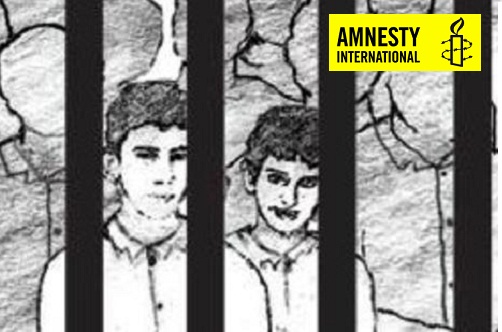Children are being routinely detained, ill-treated and tortured in Bahrain, said Amnesty International in a new briefing published today.
Scores of children arrested on suspicion of participating in anti-government protests – including some as young as 13 – were blindfolded, beaten and tortured in detention over the past two years the organization said. Others were threatened with rape in order to extract forced confessions.
“By rounding up suspected under-age offenders and locking them up, Bahrain’s authorities are displaying an appalling disregard for its international human rights obligations,” said Said Boumedouha, Deputy Director of Amnesty International’s Middle East and North Africa Programme.
“Nearly three years after Bahrain’s security forces used excessive force to crush anti-government protests, they now appear to be targeting children in an intensified crackdown. All children under the age of 18 who have not committed any recognizable offence must be released immediately. Any allegations of torture and ill-treatment must be thoroughly investigated.”
According to reports received by Amnesty International there are at least 110 children aged between 16 and 18 held at the Dry Dock Prison, an adult facility in al Muharraq Island, pending investigation or trial.
Most children have been arrested on suspicion of participating in “illegal gatherings”, rioting, burning tyres or throwing Molotov cocktails at police. Many were seized during raids while they were playing at home and even at a local swimming pool. Several were denied access to their families for extended periods and interrogated without their lawyers.
Children under the age of 15 who have been sentenced are held at a Juvenile Centre in Manama under Ministry of Interior control. During the day they are attended by social workers but at night, when most abuses tend to take place, Bahraini police take over. At the age of 15 those held in the Juvenile Centre are transferred to adult prisons such as Jaw Prison in southeast Bahrain to serve the remaining prison sentences.
Bahrain is a signatory to the UN Convention on the Rights of the Child which defines a child as anyone below the age of 18. The convention also explicitly prohibits the torture or other cruel, inhuman or degrading treatment or punishment.
The organization is also urging the government of Bahrain to review legislation including the Juvenile law and the Penal code to ensure that they are fully compatible with international standards.
In August, Bahrain’s juvenile law was amended to indicate that the parents of anyone under the age of 15 who takes part in a demonstration, public gathering or sit-in would receive a written warning from the Ministry of Interior. If a second offence is recorded within six months the child’s father could face jail, a fine or both.
“Bahrain’s government purports to respect human rights yet it is brazenly flouting international obligations on a routine basis by resorting to extreme measures such as imposing harsh prison sentences on children,” said Said Boumedouha.
Amnesty International is calling on Bahrain to consider alternative penalties for children who have committed internationally recognizable criminal offences such as probation and community service.
Background
Since Bahrain’s popular uprising began on 14 February 2011, gross human rights violations have been committed by security forces who used excessive force against protesters killing dozens. At least 2,000 people are languishing in jail. Many trials fell short of fair trial standards. Amnesty International has adopted 20 of those jailed as prisoners of conscience. Widespread impunity for abuses carried out by the security forces continues to be a problem.
Bahrain: Children in a maze of injustice
Download:


